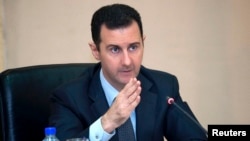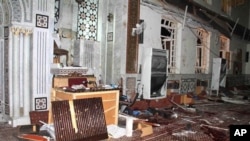Syrian President Bashar al-Assad vowed Friday to purge his country of extremists he blames for a suicide bombing that killed at least 49 people at an ancient Damascus mosque.
In a statement carried in the official Syrian Arab News Agency, President Assad said the blood of those killed in the Thursday attack "would not go in vain," promising to eliminate the "forces of darkness and extremist" ideology responsible.
Among those killed in the attack was longtime pro-government cleric Mohammed al-Buti, who had been a fierce critic of rebels fighting to topple President Assad.
Several members of the Syrian opposition were quick to deny responsibility for the bombing - the first suicide attack on a mosque during the country's two-year-old conflict.
During the uprising, President Assad has used such incidents to paint the opposition as extremists and terrorists, though many opposition members suspect the government is behind the bombings. Al-Qaida-linked groups have also claimed some attacks on Assad loyalists.
Rebels and the Syrian government also accused each other this week of using chemical weapons during an attack near the hotly contested town of Aleppo.
On Thursday, U.N. Secretary-General Ban Ki-moon ordered an investigation into the Syrian government's allegations that rebels used such weapons in a rocket attack. Ban called on all parties in Syria to grant full access and cooperation to the investigators.
"There is much work to do and this will not happen overnight. It is obviously a difficult mission," he said. "I intend for this investigation to start as soon as practically possible. Again, my announcement should serve as an unequivocal reminder that the use of chemical weapons is a crime against humanity."
U.S. President Barack Obama said he is "deeply skeptical" of the claim that rebels used chemical weapons. He said Washington will carry out its own investigation.|
Some information for this report was provided by AP.
In a statement carried in the official Syrian Arab News Agency, President Assad said the blood of those killed in the Thursday attack "would not go in vain," promising to eliminate the "forces of darkness and extremist" ideology responsible.
Among those killed in the attack was longtime pro-government cleric Mohammed al-Buti, who had been a fierce critic of rebels fighting to topple President Assad.
Several members of the Syrian opposition were quick to deny responsibility for the bombing - the first suicide attack on a mosque during the country's two-year-old conflict.
During the uprising, President Assad has used such incidents to paint the opposition as extremists and terrorists, though many opposition members suspect the government is behind the bombings. Al-Qaida-linked groups have also claimed some attacks on Assad loyalists.
Rebels and the Syrian government also accused each other this week of using chemical weapons during an attack near the hotly contested town of Aleppo.
On Thursday, U.N. Secretary-General Ban Ki-moon ordered an investigation into the Syrian government's allegations that rebels used such weapons in a rocket attack. Ban called on all parties in Syria to grant full access and cooperation to the investigators.
"There is much work to do and this will not happen overnight. It is obviously a difficult mission," he said. "I intend for this investigation to start as soon as practically possible. Again, my announcement should serve as an unequivocal reminder that the use of chemical weapons is a crime against humanity."
U.S. President Barack Obama said he is "deeply skeptical" of the claim that rebels used chemical weapons. He said Washington will carry out its own investigation.|
Some information for this report was provided by AP.






